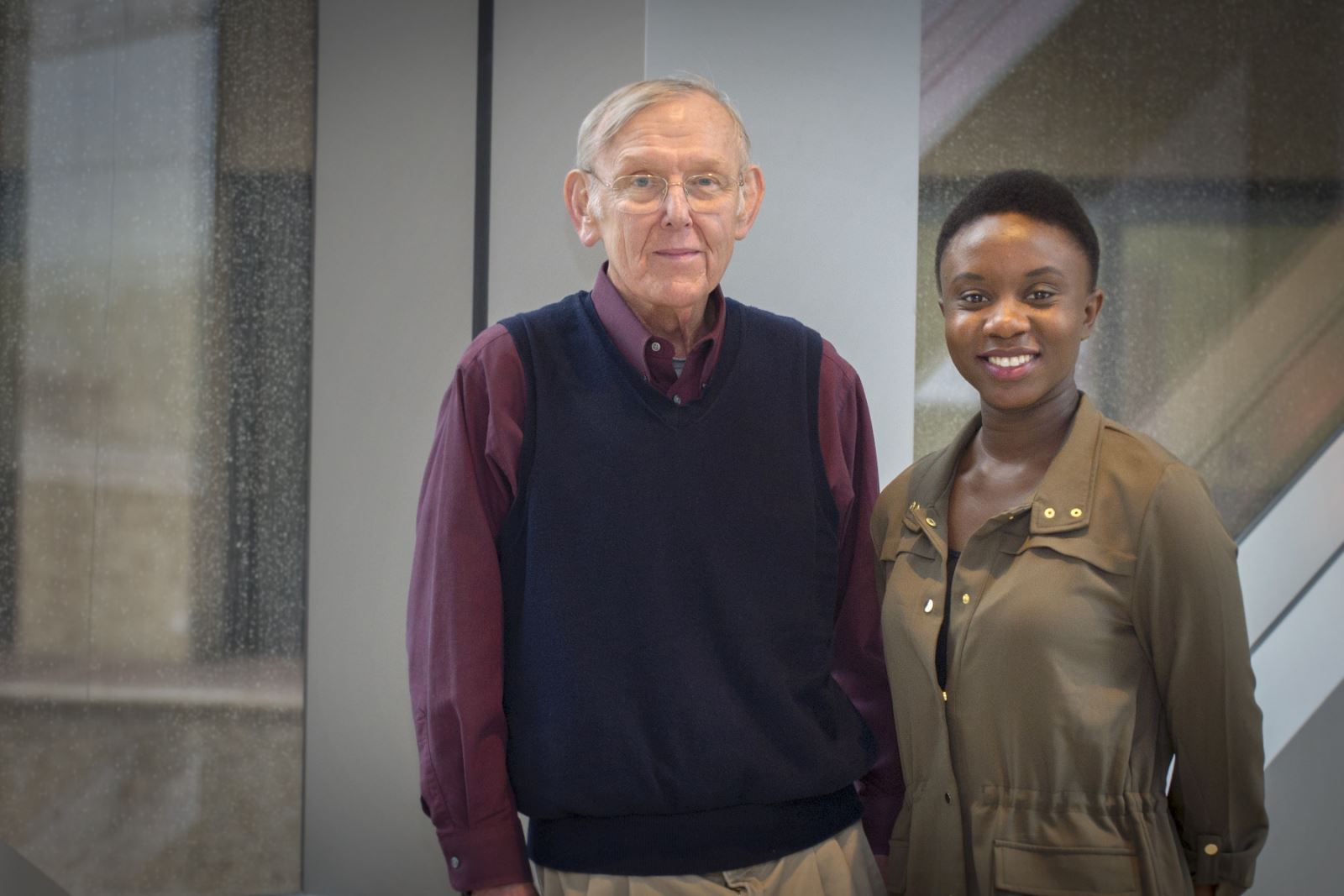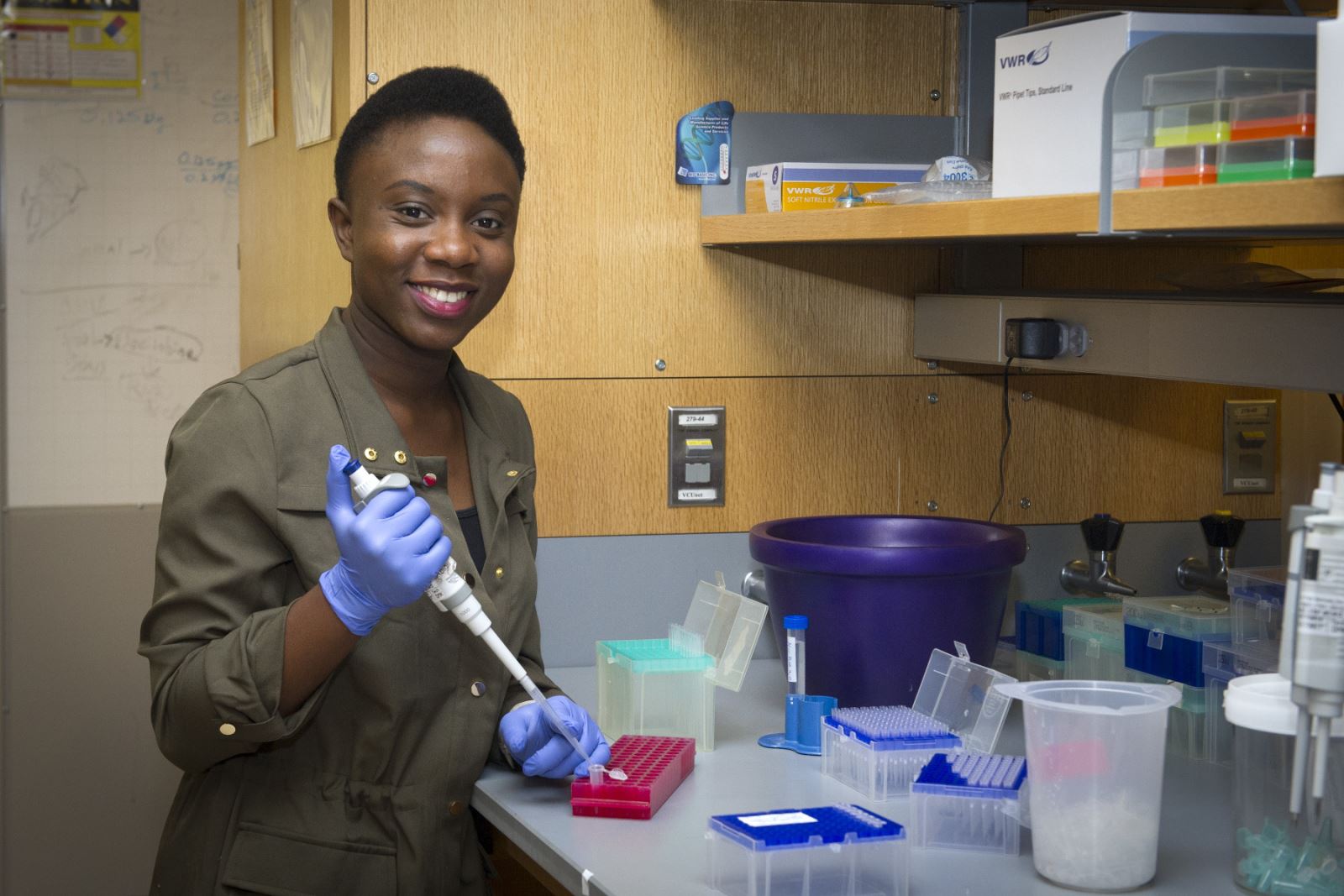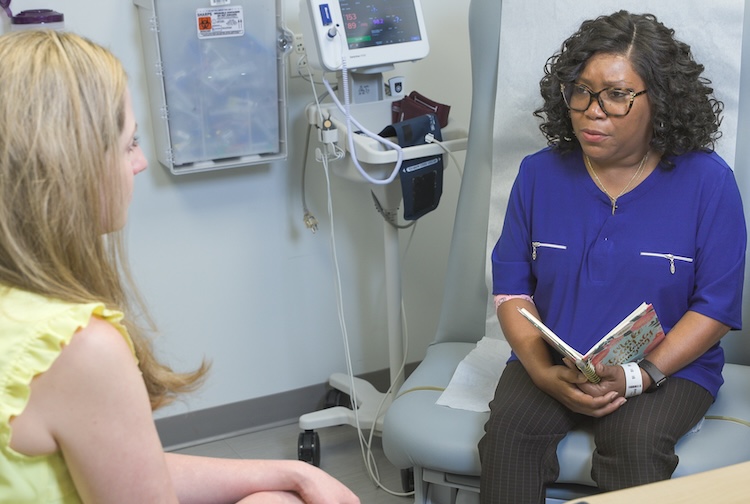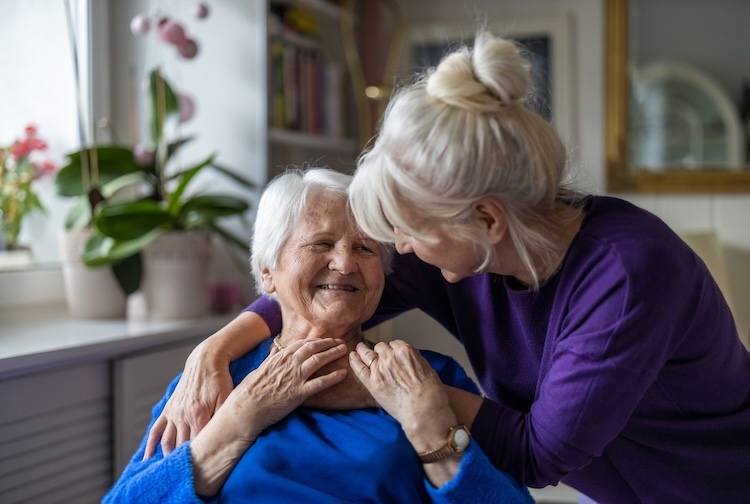Beyond the Lab: VCU School of Medicine has hosted international biomedical sciences students for 30 years
December 14, 2016
Wednesday, Dec. 14, 2016
As an undergraduate biomedical sciences student at the University of the West of England, Abigail Oyelayo enjoyed studying science, but she wasn't sure she wanted to pursue a career in laboratory research after graduating.
“I wanted to make sure what I am going into for my career will be something I will enjoy for the next 40 years,” the 21-year-old said.
Oyelayo is one of three UWE students currently completing a yearlong research internship at Virginia Commonwealth University School of Medicine. The Nigerian-born Brit is studying the genetic origins of leukemia in the laboratory of Seth Corey, M.D., a professor of hematology and oncology at Children's Hospital of Richmond at VCU.
“I am looking at why two specific genes can cause leukemia in children,” Oyelayo said. “The whole middle bit is quite a gray area and there are many theories.”
For 30 years, VCU has partnered with UWE to bring British undergraduate students to Richmond for a year of direct experience in basic research working in the laboratories of VCU faculty members. The principal objective of the educational exchange program is to provide students with research methods training so that they graduate as highly capable scientists.
“The intention is to give students practical experience in a research laboratory,” said VCU School of Medicine professor Jan Chlebowski, Ph.D. Chlebowski has directed the program since its inception in 1987. In the past 30 years he has overseen more than 100 student internships at VCU, doing everything from connecting students with faculty advisors to picking them up from the airport when they arrive in the U.S.
“I get a lot of enjoyment out of providing the opportunity for students,” Chlebowski said. “I like having the opportunity to make connections.”
Three decades of learning
The VCU-UWE exchange was established by former VCU microbiology faculty member Paul Phibbs, Ph.D., who had contacts in England and made arrangements for the first UWE student to study at VCU. Before the student arrived, Phibbs was offered chairmanship of the microbiology department at another university. Chlebowski stepped in when Phibbs left and has directed the program ever since.
In addition to his role as a professor of biochemistry and molecular biology, Chlebowski reviews applicants for the medical school's Ph.D. programs as the associate dean for graduate education.
“Both the private and academic sectors place immense value on research experience,” Chlebowski said. “Having practical experience in something other than a purely academic setting is increasingly valued.”
UWE students come to VCU between their second and third year of undergraduate education. At English universities, bachelor's degree coursework usually lasts three years, so by studying at VCU they add a year to their undergraduate program.
Students are selected from a pool of about 100 applicants enrolled in a four-year biological sciences honors program at UWE. The number of UWE students who study at VCU varies from one to seven each year. While they are here, they function as a graduate student working on a research project at the master's or Ph.D. level.
Each student is paired with a School of Medicine faculty advisor, with selection based not only on the appropriateness of the area of research, but also with a view to the critical function of the faculty member as mentor and role model. Faculty advisors provide a modest stipend to the student that comes from the faculty's research grants. The stipend covers the students' living expenses for the year they are here.
The partnership with UWE is one of VCU's oldest and has fostered several faculty and student exchanges in multiple fields. Beginning in the spring of 2005, VCU began offering study abroad opportunities at UWE for biology and forensic science undergraduate students through the Global Education Office.
While practical laboratory experience is an important element of the study abroad program, Chlebowski said the sense of confidence and maturity that students gain from their year at VCU is even more valuable.
“You walk into something completely foreign to you and you manage to survive,” he said. “That does wonders for self-confidence.”
“A catalyst for graduate education”

After completing his Ph.D. in organic chemistry at Case Western Reserve University, Chlebowski traveled to England where he spent two years studying at University College of London from 1969 to '71. As a postdoctoral researcher, Chlebowski investigated the feasibility of making organic molecules with particular properties of ever-expanding size without using natural means. He valued his time in the laboratory, but he says the most significant aspect of the experience was what happened outside the lab.
“It was life-transforming,” Chlebowski said, adding that the two years abroad changed his perspective on America. “It is satisfying to see the same thing happening to the UWE students. What they say at the end of their year here mirrors what I felt in terms of the value of my study abroad experience.”
In the VCU-UWE program's early years, Chlebowski would drive to Washington to pick up students from Dulles Airport. Upon returning to Richmond, he would help them find apartments and rent furniture. “We had wonderful adventures,” Chlebowski said.
Former UWE student Sarah Golding remembers meeting Chlebowski when she first came to VCU in the summer of 2000. “We didn't have anything,” Golding said. “Dr. Chlebowski handed us a towel, a washcloth, a bar of soap and a set of sheets.”
The next day, Chlebowski took the students shopping for groceries and supplies. “Then he took us to Maymont and made us walk in the 100-degree heat around the whole park,” she said with a laugh. “He would just be charging along and we were exhausted because it was so hot.”
“The VCU-UWE program is a catalyst for graduate education. ”
Despite the heat, Golding treasured her research internship at VCU and says she considers Chlebowski her “academic father.” After returning to England to complete her undergraduate degree, Golding came back to VCU to start doctoral research at VCU School of Medicine. She earned her Ph.D. in molecular radiobiology from the University of the West of England in 2006, but she did the research for the degree at VCU in the laboratory of Kristoffer Valerie, Ph.D., who is a professor in the Division of Radiation Oncology at VCU School of Medicine. Valerie was Golding's advisor during her undergraduate year at VCU.
“The VCU-UWE program is a catalyst for graduate education,” Golding said. Many UWE students who study at VCU for a year return to the United Kingdom to pursue training at the Ph.D. level, and five students have returned to VCU to earn their Ph.D. here.
In 2011, Golding joined VCU's Department of Biology as the inaugural director of undergraduate research. She also teaches sophomore through senior-level undergraduate biology. “My goal is to get students in the lab as soon as possible,” Golding said. “Getting hands-on experience in science makes a difference as to whether or not someone becomes a scientist. We need students to get excited about what science looks like for real, not just in textbooks.”
Golding has continued to be involved with the UWE program. As a doctoral researcher, she served as a faculty advisor for two UWE undergraduate students. For the past six years, she has hosted students at her home in Bon Air for the first few days they are in Richmond. “It is challenging when you get off a long flight to be thrown into dorms,” she said. “Now that I am older and have a home, I invite students here.” Golding also keeps kitchen equipment stored at her house to distribute to students when they arrive and takes them shopping for supplies in their first few days in the U.S.
She echoes Chlebowski's sentiments about the exchange program being more than just an opportunity to work in a laboratory. “Nobody walks away from an international experience without gaining something,” she said. “Even if you don't have a good time, when you look back at the experience you will have learned something.”
Confidence boost

When Oyelayo arrived at VCU in August, her research laboratory experience was limited to guided classroom experiments.
“It took me awhile to figure out how to do everything independently,” she said of the experiments she now performs daily at Massey Cancer Center. “I did a lot of shadowing and got a lot of help and eventually I figured out what I was doing without spilling too many chemicals and breaking things.”
In just four months Oyelayo says she has learned how to operate unaided as a lab researcher, performing all of her assigned experiments without supervision. “Sometimes you can't follow protocols and you need to tweak the experiment,” she said. “But it's a fist-pump moment when you finally get it right and can move on to the next step.”
In addition to the lab experience, Oyelayo has enjoyed living away from England for a year, exploring the U.S. and making friends from around the world at the West Grace Street Student Housing dormitory where she lives with other international students.
“It is interesting to see how all these international students can come together and have so much fun,” she said, adding that she has been to Florida and Chicago since arriving and plans to travel more while she is here.
“I don't want to leave,” she said.
The real-world laboratory experience has also given Oyelayo a better idea of what she wants to do after graduating. She is considering returning to VCU after completing her degree at UWE to pursue a Ph.D. in immunology.
“This experience has made me way more independent,” she said. “I am more confident working in a real laboratory, not just one at a university, and more able to do things by myself and think by myself. It has built maturity.”
Subscribe for free to the weekly VCU News email newsletter at https://news.vcu.edu/ and receive a selection of stories, videos, photos, news clips and event listings in your inbox every Thursday.




